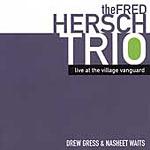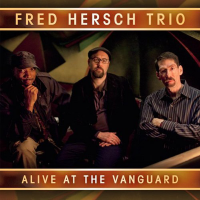Home » Jazz Articles » Bailey's Bundles » Fred Hersch and The Village Vanguard
Fred Hersch and The Village Vanguard
The prospect of Hersch composing and recording became a stark reality, that while temporary could have very well been permanent. Diagnosed with AIDS in the 1990s, Hersch has had related health problems since that time, reaching a crescendo in 2008, when the HIV invaded his brain. Hersch developed AIDS dementia and ultimately spent two months in a coma, from which he emerged much diminished. Hersch lost a majority of motor function requiring the better part of a year to regain.
Hersch made a full recovery, and returned to recording and performing. Regarding performing, Hersch has has a long and prosperous relationship with New York City's Village Vanguard. Did Hersh's illness affect his playing? Compare his trio set of May 16- 18, 2002 (Live at the Village Vanguard) with his solo recording of 2011 (Alone at the Village Vanguard) and his more recent trio recital (Alive at the Village Vanguard).
 Fred Hersch Trio
Fred Hersch TrioLive at the Village Vanguard
Palmetto Records
2002
A hallmark of a Fred Hersch trio performance from the late 1990s and the early 2000s was the crisp precision and urgent discipline with which Hersch surrounded his improvisations. His performances all had an orderly beginning, middle and end with plenty of room to stretch out and always a way back to the beginning. This is well approximated on this 2002 Village Vanguard set with bassist Drew Gress and drummer Nasheet Waits. Hersch is all angular intelligence and fractured concepts assembled as mosaic. The pianist introduces Thelonious Monk's "Bemsha Swing" with tres elbows, alluding to the theme before laying it down properly with the rhythm section. Once the bass and drums enter, the piece is a strange jake-leg lock-step. It is beautiful Monk to be sure, but regimented.
Hersch favored crisp transitions and exact codas, as can be heard in "Phantom of the Bopera" and "Stuttering." This made his performances of the period breathtaking for their precision and tidy structure. Noted once as a mercurial and exacting band leader, his 1990s and early 2000 live performances were exciting affairs full of fine, if not too tightly scripted playing. No matter, Hersch has been pulling himself away from the bulk of post-Bill Evans pianists, establishing himself as genre of one.
 Fred Hersch
Fred HerschAlone at the Village Vanguard
Palmetto Records
2011
An undiminished Fred Hersch appeared at New York City's Village Vanguard for a rare solo piano recital at the venue. It is appropriate that Hersch be an exception. His solo recording from Maybeck Hall (Live at Maybeck Hall, Volume 31, Concord Records, 1993) He opened with the David Mann/Bob Hilliard composition for Frank Sinatra "In the Wee Small Hours Of the Morning" performing the piece as Liszt interpreted Schubert songs: with a shimmering left hand beneath the right hand tentative on the melody. Hersch deftly sparks the coals before blowing on them in his original Gottschalk-inspired American pastoral "Down Home (Dedicated to Bill Frisell). Block chords and round consonance, "Down Home" is like Edward MacDowell meets Hank Jones down by the riverside.
Hersch plays with a renewed deliberateness, but that does not mean he has not loosened up. His chops remain intact and his imagination fertile. He is wistful on "If Ever I Should Leave You" and angular on his dedication to saxophonist Lee Konitz ("Lee's Dream"). Hersch's own "Pastorale" is a classical miniature dedicated to German pianist and composer Robert Schumann. It is a ballad in character and could be imagined as an art song very easily. Hersch's reading of Sonny Rollins' "Doxy" in this solo performance is reprised on Alive at the Village Vanguard.
 Fred Hersch Trio
Fred Hersch TrioAlive at the Village Vanguard
Palmetto Records
2012
Fred Hersch leads his new trio of bassist John Hebert and drummer Eric McPherson through a two-program where the pianist has carefully interwoven his original compositions among some surprising and meaningfully chosen standards. The pianist's "Havana" and "Tristesse (for Paul Motian)" introduce Hersch's post-illness trio thinking, revealing a deliberateness of design that would transfer to his standards interpretation. Hersch plays Charlie Parker's brisk be-bop against a medley of Ornette Coleman's "Lonely Woman" and Bill Evans' "Nardis." Both bear Hersch's idiosyncratic, Monkian approach to fractured rhythm and alternate phrasing. On "Lonely Woman" McPherson establishes an anxious setting on which Hersch and Herbert explore Coleman's anger therapy melody. "Nardis" is seamlessly interpolated and then extrapolated from in a reprise of the "Lonely Woman" melody. It is spooky and final.
"Softly, As in a Morning Sunrise" and "Doxy" close the first disc properly, with a sharpening of Hersch's deliberate approach. The edges of these songs are sharp and well defined. Hersch solos confidently, allowing his rhythm section the same privilege. "I Fall In Love To Easily" and the medley of "The Song Is You / Played Twice" are almost tactile in their delivery, Hersch digging deep rhythmically and harmonically. The original "Sartorial (for Ornette)" bookends with "Lonely Woman" showing Hersch's assimilation and taming of the free jazz. Hersch continues to compel and delight on this very fine live trio recording.
Tracks and Personnel
Live at the Village Vanguard
Tracks: Bemsha Swing; At the Close of the Day; Phantom of the Bopera; Endless Stars; Swamp Thang; Stuttering; Some Other Time; Days Gone By; Miyako/Black Nile; I'll Be Seeing You.
Personnel: Fred Hersch: piano; Drew Gress: bass; Nasheet Waits: drums.
Alone at the Village Vanguard
Tracks: In The Wee Small Hours Of The Morning; Down Home (dedicated to Bill Frisell); Echoes; Lee's Dream (Dedicated to Lee Konitz); Pastorale (Dedicated to Robert Schumann); Doco de Coco; Memories Of You; Work; Doxy.
Personnel: Fred Hersch: piano.
Alive at the Village Vanguard
Tracks: CD1: Havana; Tristesse; Segment; Lonely Woman/Nardis; Dream Of Monk; Rising; Falling; Softly As In A Morning Sunrise; Doxy. CD2: Opener; I Fall In Love Too Easily; Jackalope; The Wind/Moon and Sand; Sartorial; From This Moment On; The Song Is You/Played Twice.
Personnel: Fred Hersch: piano; John Hebert: bass; Eric McPherson: drums.
< Previous
Into the Air
Next >
Innertextures Live
Comments
Tags
Bailey's Bundles
C. Michael Bailey
Braithwaite & Katz Communications
United States
Bill Evans
Bud Powell
Art Tatum
brad mehldau
Ethan Iverson
Palmetto Records
Thelonious Monk
frank sinatra
Hank Jones
John Hebert
Eric McPherson
Charlie Parker
Ornette Coleman
For the Love of Jazz
 All About Jazz has been a pillar of jazz since 1995, championing it as an art form and, more importantly, supporting the musicians who create it. Our enduring commitment has made "AAJ" one of the most culturally important websites of its kind, read by hundreds of thousands of fans, musicians and industry figures every month.
All About Jazz has been a pillar of jazz since 1995, championing it as an art form and, more importantly, supporting the musicians who create it. Our enduring commitment has made "AAJ" one of the most culturally important websites of its kind, read by hundreds of thousands of fans, musicians and industry figures every month.


















